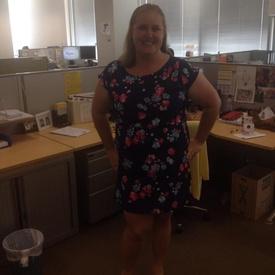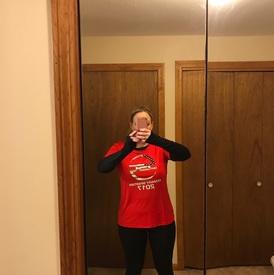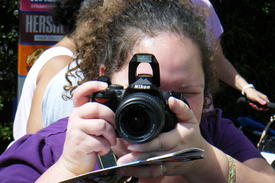My Doctor is an idiot!
Replies
-
And it was simple whole foods, some fish, very little meat.Jack Lalaine. old healthy bodybuilder. he had a great diet though.
"If man makes it, don't eat it".
That was how Jack lived so well.0 -
lmao..... wow guess the med schools should come give out the degrees in here since all docs are so horrible according to this thread.0
-
Where does Dr. think you are going to get your energy from for your workouts?0
-
Sadly - a lot of people think that way and are seriously mis-guided on nutrition - and therefore shouldn't be giving nutrition advice - like your obgyn!! Definitely keep looking for a better doctor. The med student was right. It sounds like your dr is still brainwashed like a lot of other people that to lose weight you have to starve yourself -- NOT TRUE. I just broke my plateau by UPPING my calories to 2000 a day (was at 1800, and had plateaued a few times over the past year and UPPED my calories each time!)0
-
Well to be blunt you went to a doctor that specializes in cooters. Even a generic physician doesn't have that great a grasp on proper nutrition. (And I should know, the diet mine put me on made me borderline anemic) Basically when you ask them stuff like that, it's a grain of salt sort of thing. It's only outrageous if they demand to be active in what advice they've given to see your progress.
Personally I wouldn't be switching OB's but I'd be asking to speak to whoever is his boss and tell them the information he gave you in the hopes that they will have a talk with him and either have him, in the future, not give advice or have actual advice taken from either credited books or some other source.
^^^This...your doctor chose his specialty...and it wasn't nutrition. It's like asking a podiatrist about your heart...while the basic information should be there it's not what they focus on
ETA: I saw the comment on the top of page 4 with the exact same analogy AFTER posting lol too funny0 -
I'd trust any MD over any dietitian or nutritionist.
I've never in many years of reading about weight loss heard of 'net calories', before landing here last month. Sorry but I agree with your doctors. 1000 calories plus exercise really is nothing extreme or dangerous.
I sometimes wonder what all the WLS patients who must read here and are on doctor supervised low-cal diets must be thinking of all the eating disorder/starvation fears here, based on diets much less aggressive than their own.
I know, here comes the pile-on of the internet dieters who know more than the medical profession, thanks to all the great stuff they've read on MFP.
Yes. I doubt you would hear most doctors ever use the term "net calories".0 -
I sometimes wonder what all the WLS patients who must read here and are on doctor supervised low-cal diets must be thinking of all the eating disorder/starvation fears here, based on diets much less aggressive than their own.
WLS patients aren't the 'normal' people who lose weights based on 'normal' advice. They have had their bodies permantly altered and therefore have different needs.Well I will b honest. If u do have PCOS , the specialists will tell u similar to what the ob doc told u. It's super hard for us to lose weight and all the research and specialists ( I have seen) say u hav to severly reduce calories and especially carbs. The doc wasn't an idiot. However u should ask a doctor versed in nutrition. Or better yet
My gyno at 19 didn't tell me that. (when I was first diagnosed) In fact no gyno has told me to eat under 1200 calories. And it's a load of tosh that women with PCOS need to severely reduce calories or even carbs. I've lost 37kg (up today with TOM due) eating at 1600+ calories and eating probably 50% carbs. Just the right type of carbs (i.e. no white, white is the devil!)0 -
Just the right type of carbs (i.e. no white, white is the devil!)
I totally just thought of Momma from Waterboy...
The devil.........the devil...the devil, the devil....
lol0 -
Yes, get a new doc. Not that OB/GYNs are supposed to be nutrition specialists but if he's that dumb then he's probably screwing up other more important examinations too.0
-
I'd trust any MD over any dietitian or nutritionist.
I've never in many years of reading about weight loss heard of 'net calories', before landing here last month. Sorry but I agree with your doctors. 1000 calories plus exercise really is nothing extreme or dangerous.
I sometimes wonder what all the WLS patients who must read here and are on doctor supervised low-cal diets must be thinking of all the eating disorder/starvation fears here, based on diets much less aggressive than their own.
I know, here comes the pile-on of the internet dieters who know more than the medical profession, thanks to all the great stuff they've read on MFP.
Yes. I doubt you would hear most doctors ever use the term "net calories".
I agree. But if i tell him i am burning 500 calories on average every day and then he tells me to consume 1,000. Net or not, not healthy!0 -
I went to the doctors (OB/GYN) today to get my test results. The results were perfect. I asked him what he would reccomend for diet. I was being tested for PCOS, cysts, ect. He asked me what I was currently eating. I told him that I was eating 1500 calories a day, working out 5-6 days week. I assured him that I made sure I netted 1200 calories and that I recently dropped my carb intake to 100g sticking to mostly clean eating.
He then went on to tell me that I could easily eat 1000 calories and work out. I told him that I believed that would make me net 500-600 calories most days. He that was fine. He then went on to ask me how often I weigh myself. I told him probably 2x/week. He then reccommends that I weigh myself everyday to see the gains/losses. He told me that when he sees a gain from the day before he will not allow himself a treat such as ice cream that night.
What the eff!! I think I was just perscribed anorexia!! I have 40 pounds to lose, not that much. The medical student behind him was stunned and shaking her head, "no" to me as he was speaking.
I am horrifed. Not just for me, but what about a younger, less knowledgable girl? He just green lighted an eating disorder. I think I am going to call the office manager on Monday. I had just switched OB's as my private practice provider retired.
The search is on again.
Is this crazy? What would you do?
Okay, let me try and be constructive here. I am not an OBGYN but I am a physician and I have some nutrition background.
The only thing you should probably ask your OBGYN (who is not a registered dietician - do you know there was not one book on nutrition in an entire Medical Book Store I looked in) is what foods are off limits in PCOS (see below).
http://www.3fatchicks.com/living-with-pcos-4-foods-to-avoid/
Otherwise you should speak to a RD. I'm not going to get into the 1200 calorie limit (which is set mainly to make sure most people get the macro and micro nutrients they need). I have patients that will not lose weight unless they get a diet of 900 calories a day becasue their RMR (resting metabolic rate) is so slow (quadraplegic). You're RMR can slow to 30 percent of what it should be when you get your calorie counts down to 900 (in the average person) but you still lose weight, just at a much slower pace.
IF you don't have PCOS then I based on available knowledge and scientific study you are taking in too few carbs. There are specific requirements for the average athelete - women and men - but diet plans need to be taylored to your build (how much muscle you have, etc).
The general recommendations (see Sports Nutrition: A Manual for professionals 5th edition for a summary) as follows:
Protein 1.0 grams per kilo per day (kilo = 2.2 lbs - ie 22 lbs = 10 kilos), moderately active aerobic 1.2 - 1.4 grams per kilo, resistance training 1.4 - 1.7 grams per kilo per day with some bodybuilders doing 2.0 grams protein per kilo per day. There is no evidence that numbers over this amount are useful).
Carbs: Less than 60 min of activity a day - 2 grams per kilo per day.
60 minutes of moderate activity 3-5 grams of carbs per kilo per day
1-3 hours of exercise per day 5-7 grams of carbs per kilo per day
4-5 hours of exercise per day (ie training for tour de France) - 8-12 grams of carbs per kilo per day.
The problem with consuming less carbs than this is that you will not be able to optimize performance or endurance at lower levels. The "percentage" of your diet that is made up of carbs is not as important as the absolute number.
Having said this...you can see why dieting and exercising for prolonged periods can cause a perceived problem - especially amoung women atheletes trying to maintain lean body mass while gaining stength and stamina.
Remember: Eat too many carbs and you get fat stored. However, this is about optimizing the right amount of carb for you so that you can exercise hard, get stronger, but still lose weight. Muscular builds have higher requirements than lean. So keep this in mind. The reason your question is too vague to answer appropriately is I'd have to know a lot of specifics such as what your diet consists of, not just how many calories. I'd tell you to eat heart healthy fats high in Omega 3/low in omega 6 and after exercise make sure to take in carbs with both high and low GI (Glycemic Index / and glycemic loads). I'd also need to know what kind of exercise you do and how long.
It gets more complicated too. Just as an example...rebuilding glycogen stores is what helps you recover. To do that you need carbs and protein. Did you know that Fructose (sugar found in fruit) is the least effective at helping rebuilding glycogen stores? In addition it helps to have a mix (ie sucrose, maltose, fructose, glucose) because the "carriers" that help carry these building blocks into the cell are speciific for each type of sugar. So if you take in a lot of glucose you can't use it all because the carrier is full like too many people trying to get into the elevator. If you add three different sugars they get carried in by three different carriers and that helps get glycogen synthesis done quicker aiding in recovery.
Sports drinks that combine carbs and protein and different kinds of carb sugars are preferred and convienent...but not always necessary. If you are exercising less than 90 min a day you might not need to know any of this.
For the OP or any of you that might have questions, feel free to ask. If I don't know the answer, I'll try to find out from a licensed source. These are not specific recommendations for anyone out there....just general knowledge in sports medicine. You should ask your physician and a dietician for specific advice that pertains to you!



Created by MyFitnessPal.com - Free Calorie Counter
Thank you so much for such a detailed response!0 -
Is it just me or does that sound like the HCG diet..0
-
And it was simple whole foods, some fish, very little meat.Jack Lalaine. old healthy bodybuilder. he had a great diet though.
"If man makes it, don't eat it".
That was how Jack lived so well.
Jack was pretty much a prime example of orthorexia. He hadn't eaten sugar even once since 1929. He lived on a very limited diet. His other motto was, "if it tastes good, spit it out." I think that's sad.0 -
Are you TTC? Rapid weight loss can often trigger ovulation for women who are anovulatory. This MIGHT be what you Dr was trying to get at - it would be short term, though. Since you were being tested for PCOS, I assume there might be some problem there. My reproductive endo will not give fertility drugs until a woman has lowered her BMI to a reasonable number, because weight is often a major impediment to conceiving. I would clarify with your doctor if this was merely a short term TTC diet. But if this was a diet prescribed for general weight loss, ummmm....don't ask your OB/GYN for nutrition advice anymore.0
-
you know what they call the guy that graduates last in his class from medical school??
Doctor 0
0 -
Don't give up until you find a doctor you feel comfortable with. It may take a few duds befor you get a good one
 0
0 -
My Ob-Gyn is a female; men don't get women's needs--no matter what there training is. You did the right thing by switching doctors.0
-
you know what they call the guy that graduates last in his class from medical school??
Doctor
True story!! lol0 -
Yes. I doubt you would hear most doctors ever use the term "net calories".
I agree. But if i tell him i am burning 500 calories on average every day and then he tells me to consume 1,000. Net or not, not healthy!
But you're not burning 500 calories per day. You're burning far more than that (your TDEE). For weight loss, the numbers that matter are your total burn and your total intake. What each component of your total burn is (BMR, exercise, etc.) isn't very relevant. Your body loses weight by using your stored calories in the form of body fat to fuel some portion of your total expenditure for the day. There is no reason you need to fuel today's workout (or "today's BMR") with today's calories. 1000 or 1200 calorie recommendations are more for nutrition purposes, not energy purposes. Your energy purposes will get met, as long as you have excess fat to burn. Burning excess fat calories IS healthy!0 -
Your doctor isn't an idiot. This is a common medical psychology, and honestly - it works.
It isn't the healthiest option, but it's completely viable. If you're uncomfortable with it, switch doctors. But until you've completed 11 years of school + 3 years residency, don't assume your doctor doesn't know what he's talking about.0 -
One more thing:
doctor does not equal nutritionist
Doctors are trained on how to make the body function, they rarely receive nutrition training beyond the most basic.0 -
Your doctor isn't an idiot. This is a common medical psychology, and honestly - it works.
It isn't the healthiest option, but it's completely viable. If you're uncomfortable with it, switch doctors. But until you've completed 11 years of school + 3 years residency, don't assume your doctor doesn't know what he's talking about.
I have plenty of experience with changing doctors. And not heeding their advice simply because they are doctors. One such decision saved my sons life.
Again, the sentiment is there. Rather than give crappy advice, he should of a) referred me to a RD or b) tried to figre out why I am not losing and having my period every two months. Maybe having my hormones tested?
And I am aware the MD does = RD. However, we spent more time on teaching me how to starve myself than going over my test results! He was certainly confident in his dietary skills.
Thank you for your reply. I value each response!0 -
Yes. I doubt you would hear most doctors ever use the term "net calories".
I agree. But if i tell him i am burning 500 calories on average every day and then he tells me to consume 1,000. Net or not, not healthy!
But you're not burning 500 calories per day. You're burning far more than that (your TDEE). For weight loss, the numbers that matter are your total burn and your total intake. What each component of your total burn is (BMR, exercise, etc.) isn't very relevant. Your body loses weight by using your stored calories in the form of body fat to fuel some portion of your total expenditure for the day. There is no reason you need to fuel today's workout (or "today's BMR") with today's calories. 1000 or 1200 calorie recommendations are more for nutrition purposes, not energy purposes. Your energy purposes will get met, as long as you have excess fat to burn. Burning excess fat calories IS healthy!
I told him I was burning 500 calories through exercise. I know I am not only burning that each day. I know my TDEE/BMR, ect.0 -
I'd trust any MD over any dietitian or nutritionist.
I've never in many years of reading about weight loss heard of 'net calories', before landing here last month. Sorry but I agree with your doctors. 1000 calories plus exercise really is nothing extreme or dangerous.
I sometimes wonder what all the WLS patients who must read here and are on doctor supervised low-cal diets must be thinking of all the eating disorder/starvation fears here, based on diets much less aggressive than their own.
I know, here comes the pile-on of the internet dieters who know more than the medical profession, thanks to all the great stuff they've read on MFP.
I'm not sure I understand exactly why you would trust an MD over a dietitian. RDs specialize in nutrition. Many MDs don't even have to take a nutrition class (although they should!). I'm doing a dietetic internship at an assisted living home right now and you would not believe some of the silly diet orders we get from the doctor. It is obvious he knows very little about nutrition and we often have to write him recommendations to change residents' diets.0 -
Yes. I doubt you would hear most doctors ever use the term "net calories".
I agree. But if i tell him i am burning 500 calories on average every day and then he tells me to consume 1,000. Net or not, not healthy!
But you're not burning 500 calories per day. You're burning far more than that (your TDEE). For weight loss, the numbers that matter are your total burn and your total intake. What each component of your total burn is (BMR, exercise, etc.) isn't very relevant. Your body loses weight by using your stored calories in the form of body fat to fuel some portion of your total expenditure for the day. There is no reason you need to fuel today's workout (or "today's BMR") with today's calories. 1000 or 1200 calorie recommendations are more for nutrition purposes, not energy purposes. Your energy purposes will get met, as long as you have excess fat to burn. Burning excess fat calories IS healthy!
I told him I was burning 500 calories through exercise. I know I am not only burning that each day. I know my TDEE/BMR, ect.
But why do today's exercise calories need to be 'funded' by today's intake? To lose weight, something's got to come out of fat cells (previous days' intake). If you insist on 'funding' today's BMR and today's exercise with today's calories, there's not a whole lot left for your deficit to fund. If you're sedentary, it's 20% of BMR or so. For me, that'd be 290 calories/day. Add in typical human measurement error in both intake and output and that could easily be zero, in practice, or even a surplus. You can't lose anything at all at zero deficit. At 200 calories a day deficit, you'll lose less than 2 pounds a month. Most people give up logging at those rates because it really is hardly worth it.
There's no reason to keep your deficits so conservative. That's why your doctor is recommending you can go down to 1000 calories of food regardless of your exercise. He wants you to lose the weight and see results so you keep at it.0 -
Ok, story-sharing time. I took my oldest daughter to her pediatrician out of concern for her. She was having pains (before we knew about her severe RA) and she was struggling with anorexia and I was needing someone else to tell her how bad it could be. She was 5'1" and had gone down to 71lbs! Nothing but bone with skin over it, for real. The doctor barely acknowledged it (male doctor) and said it wasn't unusual for teenagers to dip on the scale. Ummm.. oh no you didn't!!!! Took her to see another doctor who LISTENED and it was amazing! Not only did we get to the proper doctor needed for diagnosis for her disease (which the other didn't even want to run tests other than bloodwork), but she also explained the dangers of not eating and being so severely underweight. I totally lucked out because as she spoke to my daughter, she answered with "and the reason I know first hand about how organs shut down, is because I suffered anorexia". JACKPOT!
The moral of the story - find another doctor. This one is not "hearing" you, or doesn't share healthy beliefs. I know take my daughter to only a DO, not a MD. MD treat the medical issue at hand (symptoms), however a DO will involve and treat the whole body and issue at hand as well (general rule...though I am sure there will be bad ones in any category.. this is just our luck thus far)
I am so glad you found a DO to really listen and help your daughter! I have a PA that I really like, but she is at a loss too. Maybe I need to video tape myself sleeping. Maybe I am a very neat night eater who sleep eats and cleans up before going bac to bed!!lol
Funny you mention the whole sleep eating thing...it runs in my family. Anytime they put themselves on a restrictive low (no) carb diet they begin to sleep eat. It happens all of the time for them. They prefer crash dieting rather than healthy choices.
And as far as my last encounter with an idiot OB/GYN... when he pissed me off and then went in for the exam...he asked me how I was feeling I told him "LIKE KICKING YOU IN THE FACE" he rolled back said he was done and suggested I find another doctor... I said "YA THINK" Needless to say I found another doctor (female) and she found the problem, removed what needed to be removed (yet again another doctors mistake) and I have been pain free since. The only thing I regret is not showing up to the previous doctors office with pictures in hand proving he was wrong! Not all doctors graduate with straight A's!!!!!0 -
I'd trust any MD over any dietitian or nutritionist.
I've never in many years of reading about weight loss heard of 'net calories', before landing here last month. Sorry but I agree with your doctors. 1000 calories plus exercise really is nothing extreme or dangerous.
I sometimes wonder what all the WLS patients who must read here and are on doctor supervised low-cal diets must be thinking of all the eating disorder/starvation fears here, based on diets much less aggressive than their own.
I know, here comes the pile-on of the internet dieters who know more than the medical profession, thanks to all the great stuff they've read on MFP.
I'm not sure I understand exactly why you would trust an MD over a dietitian. RDs specialize in nutrition. Many MDs don't even have to take a nutrition class (although they should!). I'm doing a dietetic internship at an assisted living home right now and you would not believe some of the silly diet orders we get from the doctor. It is obvious he knows very little about nutrition and we often have to write him recommendations to change residents' diets.
Well, it is a dietician's job to recommend diet changed, so that doesn't seem too disturbing. A Physician must have a MUCH broader view of heath and a patient than nutrition. I know those that frequent nutrition sites feel that nutrition is the center of everything with respect to health but it's just a piece of the puzzle, not the center of the puzzle. IF you go to a doctor with an agenda and he or she take the visit where you didn't expect, it's not that they are idiots but that they are not there to rubber stamp an internet assisted self-diagnosis.
On the "they don't take a class" thing. Medical training is not like you might imagine. There is not a class on babies, a class on old people, a class on bug bites, a class on cancer, etc. Medical school is where you get the background to become a doctor. Residency is where you fully become a doctor. Most people have no clue, quite honestly, the sheer volume and breadth of knowledge a physician must have. There is no human endevour that even comes close to that rigor.
Put a different way, a dietitian is a nutrition specialist, but not a medical one. They are not qualified to make medical diagnoses or to evaluate the success of a medical treatment. They will see everything through their own prism. If i get a diet from a dietitian, follow it, and subsequently die as a result of something they missed, my heirs cannot sue them. There is no "dietetic malpractice". The physician's entire career and assets are on the like every time someone with an agenda walks into their office. So while the physician should pull a dietitian in when needed, the dietitian can only address one sliver of your health.0 -
was his name Dr. Oz?
Seriously, that was some bad advice.
HAHAHA love it.0 -
I had a similar experience at weight management clinic. At the time I saw him I weighed over 300lb , I am 6 foot tall.
He told me to drop my calories down to 1200 and not to eat back exercise calories . I said this seemed rather low
he told me some of his patients were on 300 calories per day.0 -
I'm with you. I'd be contacting the Practice Manager via a letter to let him/her know your concerns. Include what was said to you, what you believe to be true, and your sources for that belief. Make sure that you send a written letter rather than call, so that that way you have documentation that the conversation took place. (Always CYA.)
^^THIS. A good physician, just like a good practitioner in any profession, would know their limitations and refer you to an appropriate professional.0
This discussion has been closed.
Categories
- All Categories
- 1.4M Health, Wellness and Goals
- 398.2K Introduce Yourself
- 44.7K Getting Started
- 261K Health and Weight Loss
- 176.4K Food and Nutrition
- 47.7K Recipes
- 233K Fitness and Exercise
- 462 Sleep, Mindfulness and Overall Wellness
- 6.5K Goal: Maintaining Weight
- 8.7K Goal: Gaining Weight and Body Building
- 153.5K Motivation and Support
- 8.4K Challenges
- 1.4K Debate Club
- 96.5K Chit-Chat
- 2.6K Fun and Games
- 4.8K MyFitnessPal Information
- 12 News and Announcements
- 21 MyFitnessPal Academy
- 1.5K Feature Suggestions and Ideas
- 3.2K MyFitnessPal Tech Support Questions

















